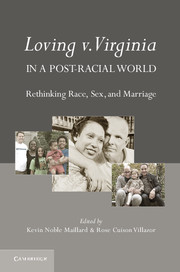Book contents
- Frontmatter
- Contents
- About the Contributors
- Acknowledgments
- Foreword
- Introduction Loving v. Virginia in a Post-Racial World
- Part One Explaining Loving v. Virginia
- Part Two Historical Antecedents to Loving
- Part Three Loving and Interracial Relationships: Contemporary Challenges
- Part Four Considering the Limits of Loving
- Part Five Loving Outside the U.S. Borders
- 14 Racially Inadmissible Wives
- 15 The Military and Interracial Marriage
- 16 Loving Across the Miles
- Part Six Loving and Beyond: Marriage, Intimacy, and Diverse Relationships
- Permission Granted
- Index
- References
14 - Racially Inadmissible Wives
Published online by Cambridge University Press: 05 July 2012
- Frontmatter
- Contents
- About the Contributors
- Acknowledgments
- Foreword
- Introduction Loving v. Virginia in a Post-Racial World
- Part One Explaining Loving v. Virginia
- Part Two Historical Antecedents to Loving
- Part Three Loving and Interracial Relationships: Contemporary Challenges
- Part Four Considering the Limits of Loving
- Part Five Loving Outside the U.S. Borders
- 14 Racially Inadmissible Wives
- 15 The Military and Interracial Marriage
- 16 Loving Across the Miles
- Part Six Loving and Beyond: Marriage, Intimacy, and Diverse Relationships
- Permission Granted
- Index
- References
Summary
The conventional narrative about the public regulation of interracial marriages is incomplete. Yet, as this chapter argues, state governments were not the only public actors who restricted the ability of individuals to marry their partners of choice. The federal government also played a crucial role in restricting interracial marriages. Specifically, during the decades before Loving v. Virginia, the U.S. government employed immigration, citizenship, and military regulations to operate like the federal counterpart of state bans against mixed marriages. Although the convergence of these laws did not formally prohibit interracial couples from getting married in the same manner that state antimiscegenation laws did, they collectively erected obstacles to citizen/noncitizen interracial couples who sought marriage and its benefits, rights, and privileges.
In uncovering the federal government’s role in controlling interracial marriages outside of the U.S. borders, this chapter aims to complicate our legal and historical understanding of the overall public policing of racial lines through marriage. In particular, the chapter counters the long-held presumption that locates the regulation of interracial relationships and marriages within the domains of states. Indeed, the federal government actively participated in restricting mixed marriages, a practice that supported and perpetuated state-sanctioned racial subordination. This extended White supremacy beyond the borders of the United States. Such transnational regulation of interracial marriages shows that the promotion of racial subordination was far broader than originally perceived in legal history.
- Type
- Chapter
- Information
- Loving v. Virginia in a Post-Racial WorldRethinking Race, Sex, and Marriage, pp. 199 - 207Publisher: Cambridge University PressPrint publication year: 2012
References
- 1
- Cited by



